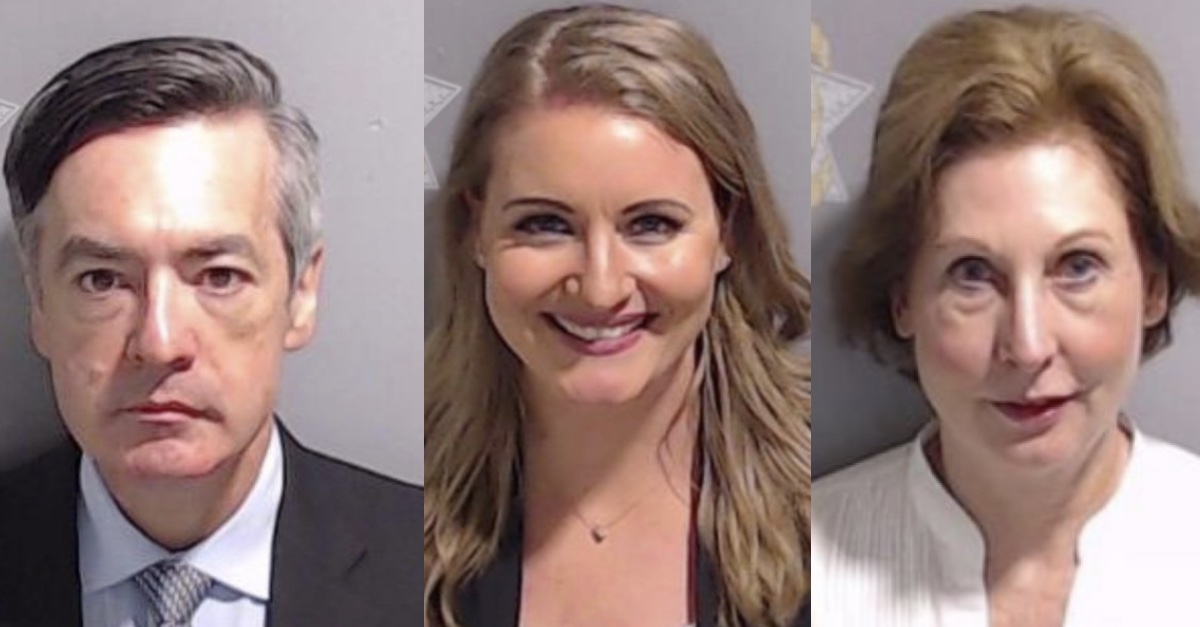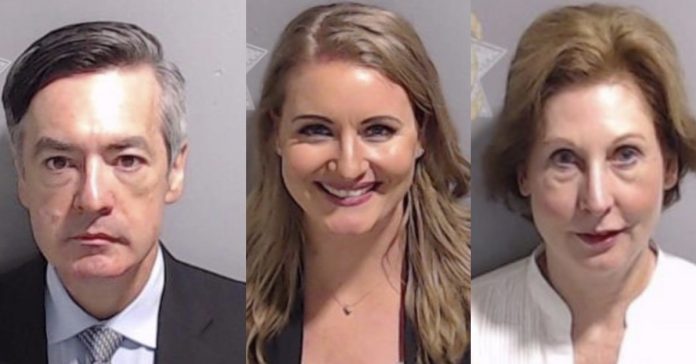
Ken Chesebro, Jenna Ellis, Sidney Powell (Fulton County Jail mug shots)
Among a flurry of Wednesday filings from special counsel Jack Smith in Donald Trump’s Jan. 6 federal prosecution was one highlighting the recent attorney guilty pleas in the Georgia RICO case and how those pro-Trump lawyers’ admissions may torpedo the former president’s floated advice-of-counsel defense.
The relatively brief 7-page filing asked U.S. District Judge Tanya Chutkan not to allow Trump to keep dragging his feet on committing, one way or another, to the advice-of-counsel defense strategy by way of a formal notice of intent. Jack Smith asserted that to permit that non-committal beyond a December deadline would be to permit undue “disruption and delay in advance of and during trial,” potentially “derail[ing] the Court’s pretrial and trial schedule.”
“His proposal is unworkable,” Smith and his team wrote, “and will risk substantial delay and disruption.”
“The Court should, instead, require him to provide formal notice of an advice-of-counsel defense and identify and produce any discovery relevant to proving or undermining it by December 18, 2023, the date by which the parties are required to provide their exhibits,” the reply continued.
Most noticeable, though, was Smith’s expectation that, if Trump does raise an advice-of-counsel defense (i.e., that he was just doing what his attorneys advised in the lead-up to Jan. 6), there will be litigation over the issue — in no small part because three lawyers just pleaded guilty in Fulton County and, as part of their agreements, will have to testify truthfully against all defendants in the sprawling Georgia RICO prosecution.
“If the defendant notices such a defense, there is good reason to question its viability, especially because in the time since the Government filed its motion three charged co-defendant attorneys pleaded guilty to committing crimes in connection with the 2020 election,” Smith pointed out, citing an on-point D.C. Circuit case that concluded: “The defense of advice of counsel necessarily fails where counsel acts as an accomplice to the crime.”
Just this week, Trump “elite strike force” campaign lawyer Jenna Ellis pleaded guilty to a felony for her role in the failed attempt to overturn the former president’s election loss in Georgia, telling Fulton County Superior Court Judge Scott McAfee: “If I knew what I knew now, I would have declined to represent Donald Trump in the post-election challenges.”
Last Friday, attorney Ken Chesebro, an attorney who drafted a legal memo asserting that, if all else failed, then-Vice President Mike Pence could replace legitimate electors with “alternate” electors on Jan. 6 and reverse Trump’s election loss, also pleaded guilty to a felony in Georgia.
One day before Chesebro pleaded guilty, Sidney Powell, the “Kraken” lawyer who Trump himself once included among his “truly great team” of “wonderful lawyers,” pleaded guilty to six misdemeanor counts of conspiracy to commit intentional interference with the administration of Georgia’s election.
“At the very least, those guilty pleas highlight the complications that may arise if the defendant should assert an advice-of-counsel defense and underscore the need to resolve all issues well before the start of trial,” Smith wrote Wednesday. “If disclosure is delayed, it may result in disruption to the trial schedule.”
It should be noted that pro-Trump lawyers Rudy Giuliani, John Eastman, and Jeffrey Clark, also indicted in the Georgia RICO case, are among the dominoes that have yet to fall, so Trump’s potential advice-of-counsel defense could be undermined even further down the line.
Have a tip we should know? [email protected]

